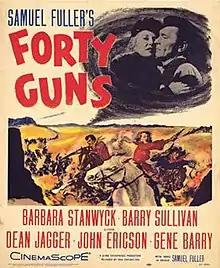| Forty Guns | |
|---|---|
 film poster by Jock Hinchliffe | |
| Directed by | Samuel Fuller |
| Written by | Samuel Fuller |
| Produced by | Samuel Fuller |
| Starring | Barbara Stanwyck Barry Sullivan Gene Barry |
| Cinematography | Joseph F. Biroc |
| Edited by | Gene Fowler Jr. |
| Music by | Harry Sukman |
| Color process | Black and white |
Production company | Globe Enterprises |
| Distributed by | 20th Century Fox |
Release date |
|
Running time | 80 minutes |
| Country | United States |
| Language | English |
| Budget | $300,000[1] |
Forty Guns is a 1957 American Western film written and directed by Samuel Fuller, filmed in black-and-white CinemaScope and released by the 20th Century Fox studio. The film stars Barbara Stanwyck, Barry Sullivan and Gene Barry.
Plot
In the 1880s, Griff Bonnell, and his brothers, Wes and Chico, arrive in the town of Tombstone in Cochise County, Arizona. Griff is a reformed gunslinger, now working for the Attorney General's office, looking to arrest Howard Swain for mail robbery.
Swain is one of landowner Jessica Drummond's forty hired guns. She runs the territory with an iron fist, permitting the town to be terrorized and trashed by her brother, Brockie Drummond, and his boys. Brockie is an arrogant drunk and bully, but he goes too far by shooting vision-impaired town Marshal, Chisolm in the leg. Thereupon, Brockie and his drunken friends start trashing the town.
Griff intervenes and pistol-whips Brockie with a single blow while Wes covers him with a rifle from the gunsmith shop. Aware of how close Brockie is to his sister, Griff makes it a point not to crack Brockie's skull. Jessica delivered Brockie when their mother gave birth for the last time.
Wes falls in love with Louvenie Spanger, the daughter of the town gunsmith, so he decides to settle down and become the town's marshal. Griff becomes romantically involved with Jessica after she is dragged by a horse during a tornado.
Two of Jessica's forty dragoons, Logan, and Savage, attempt an ambush of Griff in an alley. He is saved by youngest brother Chico, who was supposed to be leaving for California for a new life on a farm. Chico's shot kills Savage, after which Jessica's brother and hired guns try to turn the town against the Bonnell brothers.
On his wedding day, Wes is gunned down by Brockie, who is really aiming at Griff (who leans forward to kiss the bride, thereby unknowingly saving himself). Brockie is jailed for the murder. He tries to escape by using his sister as a shield, daring Griff to shoot, and is shocked when Griff does exactly that. Griff's expertly-placed bullet merely wounds Jessica, and the cowardly Brockie then becomes the first man Griff has had to kill in ten years. Brockie's last words are "Mr. Bonnell, I'm killed!"
Chico remains behind to take the marshal's job. Griff rides out, certain that Jessica hates him for killing her brother, but she runs down the dirt street after his buckboard – repeatedly calling out "Griff! Mr. Bonnell!" – and they appear to ride off together for California.
Cast
- Barbara Stanwyck as Jessica Drummond
- Barry Sullivan as Griff Bonnell
- Gene Barry as Wes Bonnell
- Robert Dix as Chico Bonnell
- Dean Jagger as Sherriff Ned Logan
- John Ericson as Brockie Drummond
- Hank Worden as Marshal John Chisholm
- Jidge Carroll as Barney Cashman
- Paul Dubov as Judge Macy
- Gerald Milton as Shotgun Spanger
- Ziva Rodann as Rio
- Neyle Morrow as Wiley
- Chuck Roberson as Howard Swain
- Chuck Hayward as Charlie Savage
- Sandy Wirth as Chico's Girlfriend
- Eve Brent as Louvenia Spanger
Production
Fuller uses every opportunity to show off the widescreen format while employing extensive use of close-ups and one of the longest tracking shots ever done at Fox’s studio at that time – over five minutes long.
Harry Sukman composed the score and conducted it as well. Jidge Carroll sings two songs onscreen in the film, the theme song titled "High Ridin' Woman," written by Harold Adamson and Harry Sukman; and "God Has His Arms Around Me," written by Victor Young and Harold Adamson. Both songs were later recorded by the western singing group, The Sons of the Pioneers, and released on their single for RCA (RCA 47-7079) on November 1, 1957.
Fuller later repeatedly claimed that the ending he wanted involved Griff killing Jessica to get Brockie and the studio overruled him. The available script copies, written by Fuller, have the same ending as the film, so there is no way to independently confirm this, but it's considered likely Fuller meant what he said, and went along with the studio heads so the film could get made. [2]
Reception
The film has received critical acclaim from modern day critics. Rotten Tomatoes gives a score of 86% based on 21 reviews, with an average score of 7.9/10.[3]
See also
References
- ↑ Aubrey Solomon, Twentieth Century Fox: A Corporate and Financial History, Scarecrow Press, 1989 p. 251
- ↑ https://www.criterion.com/current/posts/6096-forty-guns-high-riding-woman
- ↑ "Forty Guns (1957)". Rotten Tomatoes. Fandango. Retrieved October 6, 2021.
External links
- Forty Guns at IMDb
- Forty Guns at AllMovie
- Forty Guns at the TCM Movie Database
- Forty Guns at the American Film Institute Catalog
- Forty Guns at Rotten Tomatoes
- Forty Guns: High-Riding Woman an essay by Lisa Dombrowski at the Criterion Collection